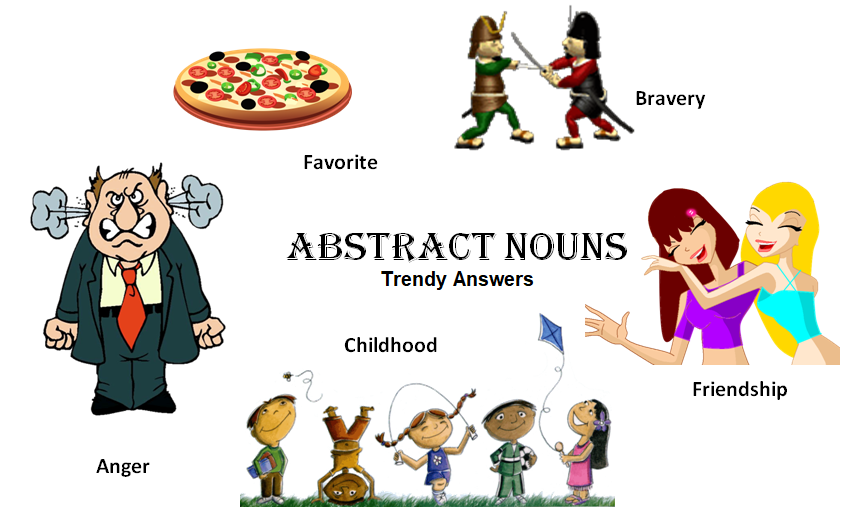Is friend an abstract noun?
No, the word “friend” is a concrete noun, a special word for physical person.
The abstract noun form is friendship.

Abstract nouns refer to intangible ideas-things that you cannot perceive with your primary senses. Words like love, time, beauty, and science are abstract nouns because you cannot touch or see them.
Without a tangible framework, abstract nouns are difficult to define by grammatical rules. In this article, we highlight the basics so you can easily use abstract nouns.
What are abstract nouns?
Nouns generally refer to things (including people, places, things, and ideas). But some things really are not! Thoughts, feelings, personality traits, and philosophical concepts don’t exist in the physical world—you can’t feel them or interact with them, so we call them abstract nouns to distinguish them from concrete nouns.
Abstract nouns vs. concrete nouns
We dive deep into abstract nouns and concrete nouns here, but there is a quick and easy way to differentiate them. If you can see, hear, taste, smell or touch it, it is a concrete noun. If you can’t, then we call them abstract noun.
Notice the difference between ‘anger’, an abstract noun, and chair, a concrete noun. You can touch the chair and see the chair, but you cannot touch or see the anger itself. (You can use your senses to notice signs of anger, such as seeing a red face or hearing a loud voice.)
As a rule, proper nouns are never abstract nouns. Proper names like the Empire State Building, Kathmandu, or Mister Rogers refer to something specific and tangible. However, this can be confusing if philosophical thought is derived from its proper noun. As an example, Karl Marx is simply a proper noun, but Marxism is clearly an abstract noun, even it is capitalized.
Examples of abstract nouns
As we said, abstract nouns are difficult to explain because they are not emotional. Sometimes it’s better to see an example to understand. (Some of these can double as verbs, especially emotions, so pay attention to their use in a sentence.)
thought
Ideas
- life
- death
- humor
- independence
- communication
- information
- honor
- trust
- pain
- pleasure
Emotions
- love
- hatred
- happiness
- sadness
- fear
- anguish
- ecstasy
Personality traits
- courage
- loyalty
- compassion
- maturity
- elegance
- stupidity
- aggression
- patience
Philosophical concepts
- industrialism
- causality
- relativity
- ethics
- capitalism
- democracy
Of course, there are thousands of other abstract terms, but here are some common terms to help you understand.
Forming abstract nouns with suffixes
You can often take root words, add suffixes, and create abstract nouns from verbs, adjectives, and even concrete nouns. This is a great way to discuss the general concepts behind things instead of specific examples.
As example take the verb relax. Add a conjunction to the abstract noun relax to describe the general state of relaxation. The adjective ‘good’ takes the suffix -ness to become an abstract noun of ‘goodness’. Other hand concrete noun Friend needs –ship to complete the abstract noun friendship.
Special words use special suffixes, so you can not just mix and match them at will. If you don’t know the correct suffix, look in the dictionary. Note: Some words change completely when they become abstract nouns. The abstract noun of ‘weak’ is ‘weakness’, other hand the abstract noun of strong is strength.
Using abstract nouns in a sentence
Abstract nouns follow the same rules as other nouns. They work well as subjects and objects, capitalize capital letters, and can take possessive forms (for example, freedom’s price). It can also be singular or plural; however, we must first determine whether it is countable or uncountable (also known as a mass noun).
Countable and uncountable abstract nouns
One of the trickiest parts about abstract nouns is determining whether they are countable or not – often they can be both, but only one is correct depending on their use.
In general, an abstract noun is uncountable if it has a general or broad meaning that refers to all phenomena.
Time flies when you’re having fun.
No one can win without intelligence.
“Success is not final; failure is not fatal.” —Winston Churchill
However, if an abstract noun refers to a specific event or phenomenon, it follows the rules of countable nouns, using articles (a, an, that) and quantifiers. If your specific abstract noun refers to more than one event, you follow the normal rules for nouns and make them plural.
My time with you lasts forever.
You have the talent to win.
“If a book about failures doesn’t sell, is it a success?” —Jerry Seinfeld
Also Read: 7 Money Rules you didn’t learn in school
When to use abstract nouns—and when not to
Abstract nouns are perfectly at home in philosophical, existential, and ideological discourse-these issues are difficult to discuss without them. Similarly, discussions about emotions and feelings often involve abstract nouns, especially when emotions are persistent or permanent.
The problem with abstract nouns is that they are vague. Since we cannot feel them physically, everyone has their own idea of what they are. “Beauty is in the eye of the beholder” The word beauty is interpreted differently by each “beholder”.
That is why good writing often includes specific examples sprinkled throughout your abstract nouns to strengthen your argument. Concrete examples illustrate our points and encourage readers to see things our way, not theirs. For example, if you are writing an essay about the importance of choosing a profession (abstract noun), it is okay to mention a specific profession, such as a doctor, mechanic, or inspector (concrete noun).
Abstract nouns and their rules can be overwhelming. We hope you have a better understanding of our guide and feel comfortable writing about it.
Also Read: What Exactly Does ABQ Mean? You’re About to Find Out!
